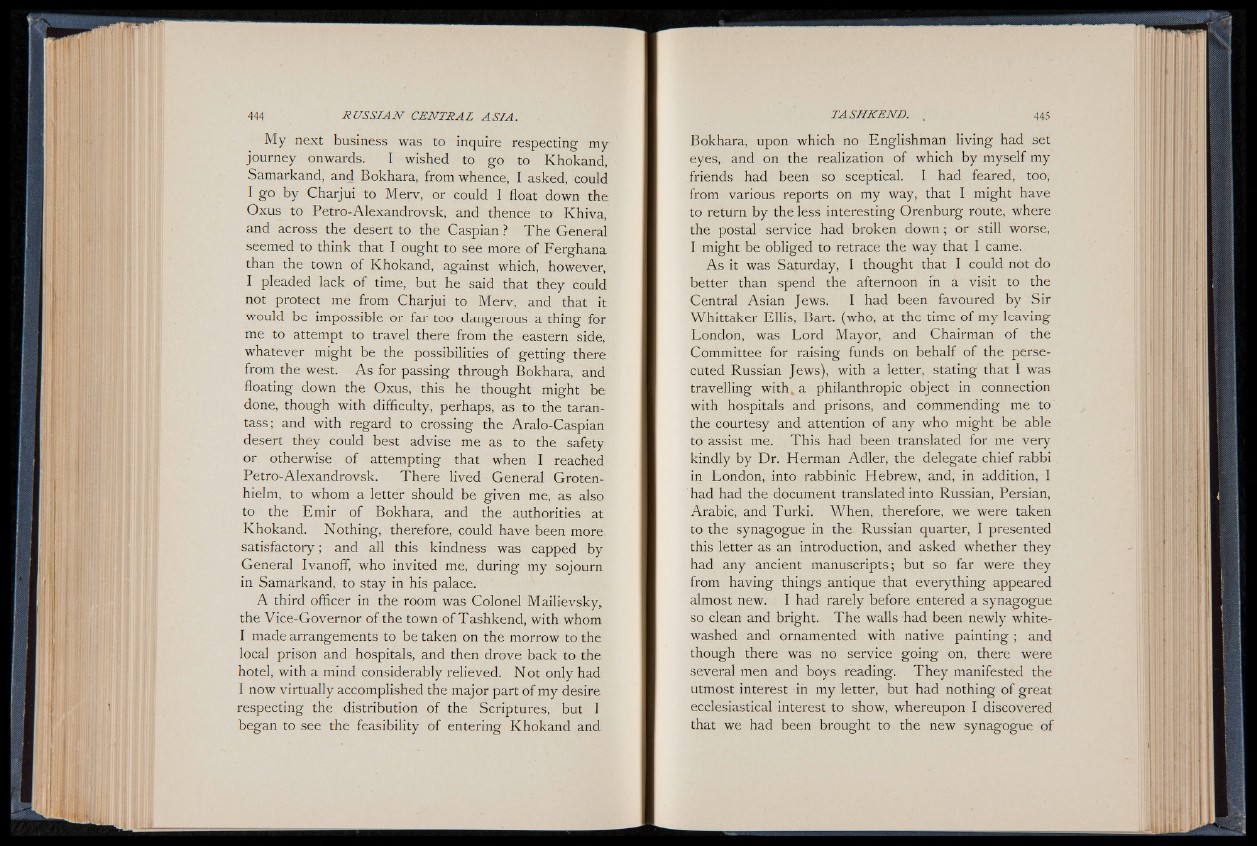
My next business was to inquire respecting my
journey onwards. I wished to go to Khokand,
Samarkand, and Bokhara, from whence, I asked, could
I go by Charjui to Merv, or could I float down the
Oxus to Petro-Alexandrovsk, and thence to Khiva,
and across the desert to the Caspian ? The General
seemed to think that I ought to see more of Ferghana
than the town of Khokand, against which, however,.
I pleaded lack of time, but he said that they could
not protect me from Charjui to Merv, and that it
would be impossible or far too dangerous a thing for
me to attempt to travel there from the eastern side,
whatever might be the possibilities of getting there
from the west. As for passing through Bokhara, and
floating down the Oxus, this he thought might be
done, though with difficulty, perhaps, as to the taran-
tass; and with regard to crossing the Aralo-Caspian
desert they could best advise me as to the safety
or otherwise of attempting that when I reached
Petro-Alexandrovsk. There lived General Groten-
hielm, to whom a letter should be given me, as also
to the Emir of Bokhara, and the authorities at
Khokand. Nothing, therefore, could have been more
satisfactory; and all this kindness was capped by
General Ivanoff, who invited me, during my sojourn
in Samarkand, to stay in his palace.
A third officer in the room was Colonel Mailievsky,
the Vice-Governor of the town of Tashkend, with whom
I made arrangements to be taken on the morrow to the
local prison and hospitals, and then drove back to the
hotel, with a mind considerably relieved. N ot only had
I now virtually accomplished the major part of my desire
respecting the distribution of the Scriptures, but I
began to see the feasibility of entering Khokand and
Bokhara, upon which no Englishman living had set
eyes, and on the realization of which by myself my
friends had been so sceptical. I had feared, too,
from various reports on my way, that I might have
to return by the less interesting Orenburg route, where
the postal service had broken down; or still worse,
I might be obliged to retrace the way that I came.
As it was Saturday, I thought that I could not do
better than spend the afternoon in a visit to the
Central Asian Jews. I had been favoured by Sir
Whittaker Ellis, Bart, (who, at the time of my leaving
London, was Lord Mayor, and Chairman of the
Committee for raising funds on behalf of the persecuted
Russian Jews), with a letter, stating that I was
travelling with, a philanthropic object in connection
with hospitals and prisons, and commending me to
the courtesy and attention of any who might be able
to assist me. This had been translated for me very
kindly by Dr. Herman Adler, the delegate chief rabbi
in London, into rabbinic Hebrew, and, in addition, I
had had the document translated into Russian, Persian,
Arabic, and Turki. When, therefore, we were taken
to the synagogue in the Russian quarter, I presented
this letter as an introduction, and asked whether they
had any ancient manuscripts; but so far were they
from having things antique that everything appeared
almost new. I had rarely before entered a synagogue
so clean and bright. The walls had been newly whitewashed
and ornamented with native painting; and
though there was no service going on, there were
several men and boys reading. They manifested the
utmost interest in my letter, but had nothing of great
ecclesiastical interest to show, whereupon I discovered
that we had been brought to the new synagogue of